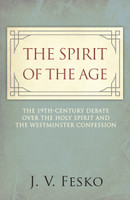
Fesko, John V.
Description
In 1903, the Presbyterian Church in the United States of America revised the Westminster Confession of Faith because they thought it was deficient regarding the Holy Spirit. In The Spirit of the Age, J. V. Fesko explores the differences between the pre-Enlightenment theology that formed the original Westminster Confession and the post-Enlightenment theology that called for its revision.
This study reveals that the pneumatology of the original Westminster Confession is marked by catholicity, whereas the revisions of 1903 represent a doctrine of the Holy Spirt that departed from the common Christianity of the ages. It also reveals that some of the underlying issues linked to the 1903 revisions are still alive today, even among Presbyterian fellowships that refused to adopt the twentieth-century revisions to the Westminster Confession.
Contents
Acknowledgments
Appendix 1: The Holy Spirit in the Westminster Standards
Appendix 2: The 1903 Additions to the Westminster Confession of Faith
Bibliography
Endorsements
“Sometimes it has been suggested by critics, both outside and inside the tradition, that the Reformed church doesn’t seem interested in keeping in step with the Spirit. While Reformed Christians should always be keen to pursue intellectual and theological repentance as prompted by God’s Holy Word, we do well to actually engage our exegetical and confessional tradition with alert awareness. Fesko helps us do so, that we might find treasures old and new in the ways in which earlier Christians and then the Reformed divines acclaim the Spirit of God as Lord and giver of life.”
—Michael Allen, John Dyer Trimble Professor of Systematic Theology, Reformed Theological Seminary, Orlando, Florida
“J. V. Fesko investigates the progressive philosophy of men like Charles Briggs, Philip Schaff, and John Williamson Nevin to explain why the Presbyterian Church in the United States of America added a chapter on the Holy Spirit to the Westminster Confession of Faith in 1903. Where those men had concluded the Westminster divines had an inadequate theology of the Holy Spirit when they issued the confession in 1646, Fesko argues that the divines’ theology of the Holy Spirit in the WCF is actually robust and catholic. He is especially insightful in showing the divines’ close connection between Christology and pneumatology, as this partially explains the lack of a separate chapter on the Holy Spirit in the WCF. There are lessons for us still today in this cautionary tale that led to the unnecessary 1903 revision.”
—Robert J. Cara, Provost and Chief Academic Officer, Reformed Theological Seminary, Charlotte, North Carolina
“Critics of Calvinism often refer to Reformed Protestants as God’s ‘frozen chosen,’ an expression that evokes belief in election and the absence of Spirit-filled piety. John Fesko’s book proves how wrong that characterization is. The work of the Holy Spirit, as Fesko shows, has long been a subject of reflection and meditation for theologians and pastors. The reason can only be that Calvinists, like Fesko, seek and encourage evidence of the Spirit’s work in salvation.”
—D. G. Hart, Distinguished Associate Professor of History, Hillsdale College, Hillsdale, Michigan
About the Author
J. V. Fesko is an ordained minister in the Orthodox Presbyterian Church, and is also academic dean and associate professor of systematic theology at Westminster Seminary California.